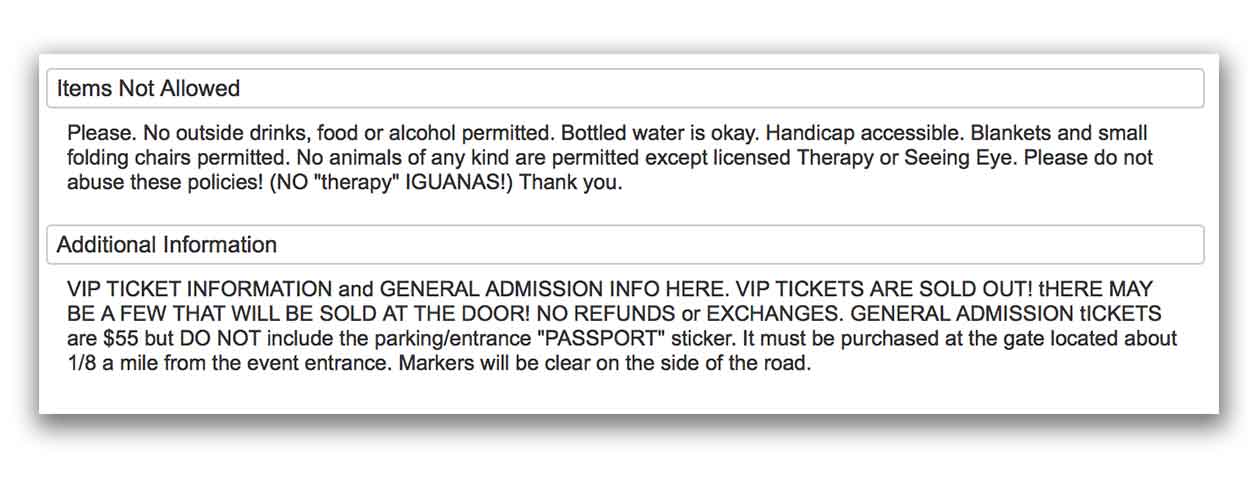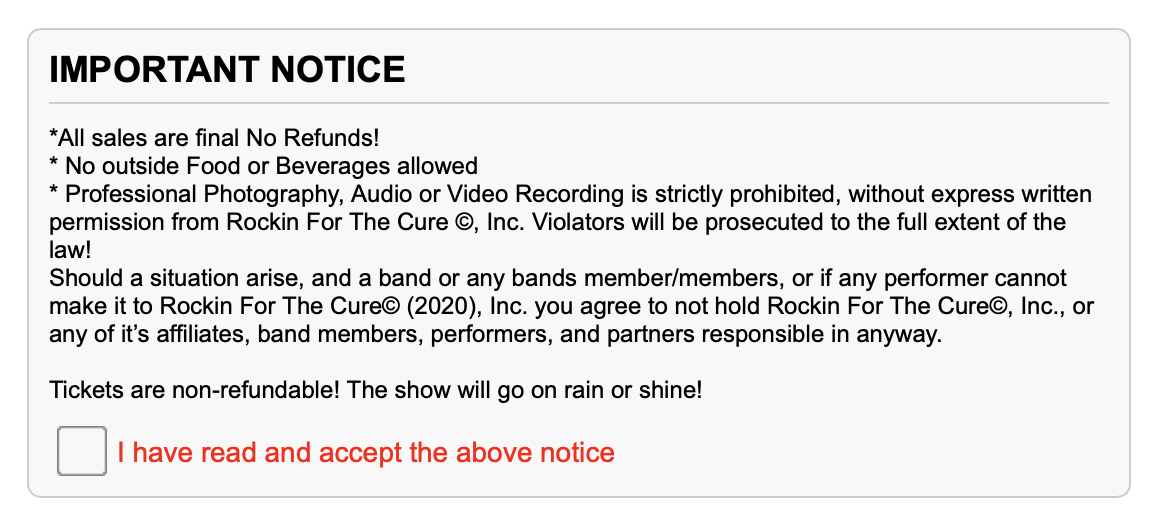10 Terms & Conditions You Need to Include at Ticket Checkout
Event promoters should know the fact that the terms and conditions of their agreements are of the utmost importance.
Also known as the “birdseed” and the “deets” for short, the terms and conditions matter a great deal.
Fail to include the information detailed below in your terms and conditions and it is only a matter of time until you are served with a lawsuit or end up with unhappy customers who go out of their way to bad-mouth your business.

1. Define your business, services and event
Your customers deserve to know what they are getting in exchange for payment. The terms and conditions should describe your value offering.
This is your opportunity to explain your business, its services and the event in question. Fail to explain what customers are getting and you will create an opportunity for customers to criticize your business or possibly file a lawsuit.
2. Do you offer refunds? Include that
If your business offer refunds, make it perfectly clear in the terms and conditions. Furthermore, you must explain the nuances of your return policy. This way, if a customer asks for a refund, you can point to your refund policy in the terms and conditions for immediate clarity.

3. Is this event rain or shine? Define your cancellation policy.
If inclement weather will spur the cancellation of your event, let it be known in the terms and conditions.
From rain to snow, natural disasters and beyond, the terms and conditions should explain in plain English what type of weather will prompt the cancellation of the event.
4. Are they any warranties or guarantees?
Some customers refuse to purchase event tickets unless they are provided with some sort of guarantee or warranty. If your business offers any such reassurance, explain the details of the guarantee or warranty in the terms and conditions.
5. Are you including ticket add-ons at the checkout and do you need to define anything about that service?
Some event planners think it is prudent to include ticket add-ons during the checkout process. If you decide to provide such add-ons, explain them in the terms and conditions.
If the add-on shave the potential to create a conflict or has any other pertinent details customers should know, define them for complete transparency.
6. Think of all the scenarios that could go wrong to make sure they are covered
Take a moment to brainstorm everything that could go wrong with your event. Think of all the potential scenarios that might arise. The terms and conditions should detail the company’s policies in the event thatsuch scenarios arise and what action will be taken.

7. Can people be kickedout of your event? Make sure you clarify the reason why someone may be removed from the event.
Explain what actions will prompt ejection from the event. Explain exactly why paying customers will be removed from the event.
'When in doubt, be general when detailing behaviors that prompt ejection so unsavory behavior of every type qualifies as a justifiable reason for ejection.
|
Easy-to-build custom terms & conditions Purplepass offers a variety of customization options |
8. If serving alcohol, clarify the drinking age
Whether you will be selling beer, wine, hard liquor, daiquiris or anything else, the terms and conditions should state the drinking age for the purchase as well as the consumption of alcohol at the event.
If people can transfer their tickets to different event dates, be sure to include details and restrictions for doing so.
9. Can guests transfer tickets?
Nowadays, plenty of event promoters allow customers to transfer tickets to a different event date. If this is your policy, explain the details of your ticket transfer policy in layman’s terms.
Furthermore, if there are specific restrictions for ticket transfers, they should be detailed in your terms and conditions section.
10. Finally, let them know if all sales are final at this point in time or if they have a window to cancel for free
If sales are final after payment is submitted, customers should be made aware of that fact in the terms and conditions section.
Furthermore, if there is an opportunity to cancel sales without paying a penalty fee, such a policy must also be explained for full transparency.







